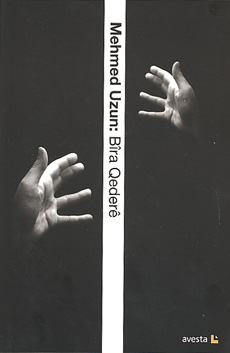“Herkes dimire; bira û birazî, yar û evindar, hêval û dost, hogir û rêger, nêz û nas… hêmû dimirin. Dora min jî hat. Niha jî dora min e…”
Mehmed Uzun died this morning in Diyarbekir. He was 54 years old and suffered of a stomach cancer.
Mehmed Uzun is one of the first authors borned in Turkey who wrote and published in Kurdish and for that reason, he faced a lot of judiciary troubles. On March 21th 1976 (Happy Newroz !) he was arrested and imprisonned in Ankara. He was judged in July 1976. The prosecutor pretending that there is no Kurds, no Kurdish language, Mehmed Uzun had to argue the cotnrary. Logically, if a crime is unreal, the punishment should be also. But Turkey was a Kafkaland where you could be condemned at 8 months for writing in an unreal language and pretending you belong to an unreal people. In 1977, he left Turkey for Sweden, and in 1981, Turkish state deprived him officially of his “Turkish” nationality.
Fortunately, Sweden was a shelter for political refugees. Mehmed Uzun received even funds to work on Kurdish language and folklore. In the aim to read classical Kurdish poets, he learnt arabic alphabet. He collected also the first Kurdish magazines, published in 20s and collaborated to the linguistic review Kurmancî.
His first novel Tu (You), was published in 1985, followed by many other publications, novels or essays.
In 1992, Turkey gave him back his nationality and in 2002 he was discharged in 2002 by the court of Diyarbakir, for an ultimate charge of separatism. In July 2005, he came back in Turkey for linving in Istanbul.ut retourner vivre en Turquie et s’installa à Istanbul. Then happened the “Black List” case. A Turkish newspaper, Aksiyon, stated that Mehmed Uzun, with 250 Kurdish intellectuals, was on a Dead list of the PKK. At this time, Mehmed Uzun criticized as so well violence and oppression from Turkish state against the Kurds as the violence of the PKK. But the former denied absolutely the fact and accused Turkish services. At the end of August, Mehmed Uzun left Istanbul to Stockholm, explaining that Aksyon was “an nationalist, islamist newspaper and had links with Safety Forces” (…) “In a country like Turkey, where political murders are committed all the time, there is always a serious motive when the name of a well-known author becomes a target” (AFP).
In December 2005, the Kurdish Regional Government awarded him for his work and his actions in favor of Kurdish language and literature. In May 2006, he knews that he had a cancer and few months to live. So he decided to come back in Diyarbakir for dying in the capitale of Northern Kurdistan. He died today, at morning and will be burried in the city next saturday. (source AFP).


Leave a Reply
You must be logged in to post a comment.